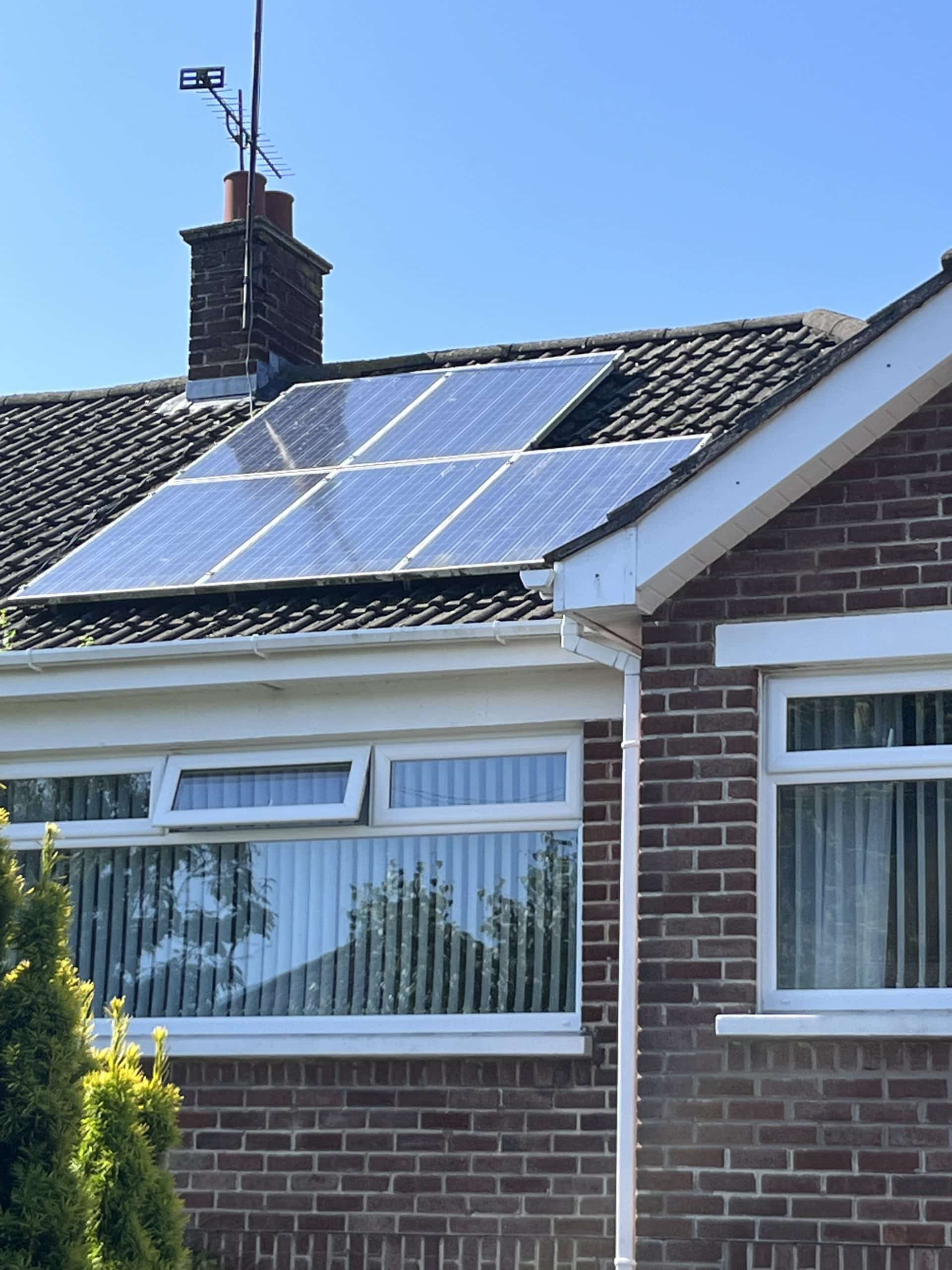Solar photovoltaic (PV) panels, play a crucial role in the renewable energy landscape of the United Kingdom & Northern Ireland (NI). As a clean and sustainable energy source, solar PV panels have gained popularity in NI and the UK due to their ability to generate electricity from sunlight. We will discuss aspects of PV panels, including their technology, benefits, challenges, market trends, policy support and installation considerations, and future prospects.
Introduction to Solar PV Panels in the UK & NI
Solar photovoltaic (PV) panels are devices that convert sunlight into electricity through the photovoltaic effect. This is when voltage or an electric current is generated in a photovoltaic cell when it is exposed to sunlight. In the UK & NI, solar PV panels are a key technology in the transition to a low-carbon and sustainable energy future. The electricity produced by PV panels can be used to power homes, businesses, and other applications, reducing reliance on fossil fuels and lowering carbon emissions.
Technology and Types of Photovoltaic Panels
Monocrystalline Silicon Panels:
Monocrystalline silicon panels are made from single-crystal silicon, offering high efficiency and a sleek appearance. These panels are known for their longevity and efficiency in converting sunlight into electricity, making them a popular choice for residential and commercial installations.
Polycrystalline Silicon Panels:
Polycrystalline silicon panels are made from multiple silicon crystals, providing a cost-effective alternative to monocrystalline panels. While slightly less efficient than monocrystalline panels, polycrystalline panels are widely used in the UK for their affordability and reliable performance.
Thin-Film Panels:
Thin-film solar panels are made from layers of photovoltaic materials such as amorphous silicon, cadmium telluride, or copper indium gallium selenide. These panels are lightweight, flexible, and suitable for various applications, including building-integrated photovoltaics (BIPV) and off-grid installations.
Benefits of Solar PV Panels in NI & the UK
Clean Energy Generation:
PV panels produce electricity without emitting greenhouse gases or air pollutants, contributing to a cleaner and more sustainable energy mix in the UK.
Energy Independence:
By generating electricity from sunlight, PV panels reduce reliance on fossil fuels and imported energy sources, enhancing energy security and independence.
Cost Savings:
Solar energy from PV panels can help homeowners and businesses reduce their electricity bills and protect against rising energy costs over time.
Environmental Benefits:
PV panels help reduce carbon emissions and mitigate climate change by displacing fossil fuel-based electricity generation with clean solar power.
Low Maintenance:
PV panels require minimal maintenance and have a long lifespan, providing a reliable and low-cost energy solution for decades.
Challenges and Considerations for Solar PV Panels in NI & the UK
Intermittency:
Solar energy generation is dependent on sunlight availability, leading to variability in electricity production throughout the day and across seasons.
Grid Integration:
Integrating solar PV systems into the electricity grid requires careful planning to manage fluctuations in generation and ensure grid stability.
Incentive Changes:
Changes in government incentives and policies, such as feed-in tariffs and export tariffs. This can impact the financial viability of solar PV installations.
Shading and Orientation:
Proper site selection, orientation, and shading analysis are essential for maximising the performance of PV panels and achieving optimal energy production.
Storage and Backup:
Incorporating energy storage solutions, such as batteries, can enhance the self-consumption of solar energy and provide backup power during grid outages.
Market Trends and Policy Support for Solar PV Panels in NI & the UK
Rapid Growth:
The UK solar market has experienced significant growth in recent years, with increasing installations of PV panels across residential, commercial, and utility-scale projects.
Feed-in Tariff (FiT):
The Feed-in Tariff scheme provided financial incentives for solar PV system owners to generate and export renewable electricity. While the FiT scheme has closed to new applicants, existing installations continue to receive payments.
Smart Export Guarantee:
The Smart Export Guarantee ensures that solar PV system owners are paid for the excess electricity they export to the grid, encouraging self-consumption and grid-balancing.
Renewable Energy Targets:
The UK government has set ambitious targets to decarbonise the energy sector and increase the share of renewables, including solar PV, in the electricity mix.
Community Solar Projects:
Community solar initiatives and shared ownership models are emerging in the UK, allowing residents to collectively invest in and benefit from solar PV installations.
Installation Considerations for Solar PV Panels in NI & the UK
Roof Suitability:
Assessing the orientation, tilt, shading, and structural integrity of the roof is essential when considering the installation of PV panels in the UK. South-facing roofs typically receive the most sunlight, however, east and west-facing roofs can still be viable options.
Regulatory Compliance:
Before installing PV panels in the UK, homeowners must ensure compliance with local building regulations and planning permissions. Restrictions may apply, in conservation areas or on listed buildings, where visual impact and architectural considerations are prioritised. Approval from the local planning authority is necessary to avoid potential legal issues.
Maintenance Requirements:
Proper maintenance is essential to ensure the long-term performance and efficiency of PV panels in the UK. While solar panels are relatively low-maintenance compared to other renewable energy systems, regular upkeep is necessary to optimise energy production. Cleaning the panels periodically to remove dirt, debris, and bird droppings can significantly improve performance.
Future Prospects for Solar PV Panels in NI
Policy Support and Renewable Energy Targets:
The UK government has set ambitious targets to decarbonise the energy sector, with a focus on increasing the share of renewables in the electricity mix. Continued policy support, like incentives for solar PV installations and grid integration measures, is expected to drive further growth in the adoption of PV panels across residential, commercial, and utility-scale projects.
Technological Advancements and Cost Reductions:
Ongoing advancements in solar technology, paired with economies of scale and declining manufacturing costs, are making PV panels increasingly affordable and efficient. Innovations such as high-efficiency solar cells and smart inverters are enhancing the performance of solar PV systems, making them more attractive to consumers and investors alike.
Emerging Trends in Energy Storage and Smart Grid Integration:
The integration of energy storage solutions, such as batteries, with solar PV systems is becoming more prevalent, enabling increased self-consumption of solar energy and providing backup power during grid outages. Additionally, smart grid technologies and demand-side management strategies are facilitating the seamless integration of solar PV into the electricity grid, enhancing grid stability and flexibility while maximising the value of solar generation.
To conclude, solar photovoltaic panels play a pivotal role in shaping the renewable energy landscape of the United Kingdom. As a clean, sustainable, and increasingly popular energy source, PV panels harness the power of sunlight to generate electricity, offering numerous benefits to both individuals and the environment.
For more information on solar panels for your home or business, contact us on 028 9592 2730 or email hello@eeco.energy







